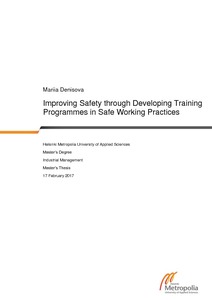Improving Safety through Developing Training Programmes in Safe Working Practices
Denisova, Mariia (2017)
Denisova, Mariia
Metropolia Ammattikorkeakoulu
2017
All rights reserved
Julkaisun pysyvä osoite on
https://urn.fi/URN:NBN:fi:amk-201702212581
https://urn.fi/URN:NBN:fi:amk-201702212581
Tiivistelmä
This thesis aims to improve safety in the case company by developing training in safe working practices (SWP) on the example of developing a training programme for welding operators. The company is a new refrigerating and gas compressor assembly plant in Russia. Presently, any systematic training in SWP is missing, and instead of a formal training, the new company employees receive only some tutoring during the first days of employment. This situation leads to increased chances of injuries and incidents at the operational site, as well as does not comply with the national health and safety regulations.
To reach the objective, best practice in training programme development are studied and, as a result, two conceptual frameworks are drafted. The first framework is used as a baseline during the interviews with the case company stakeholders to understand the current state of safety training provision. The study utilises a case study approach, and merges the data from the interviews, the best practice and benchmark documents to create a proposal.
The outcome of this study is a proposal for training in safe working practices for welding operators consisting of five elements: (a) materials for classroom training in the form of presentations, (b) a practical training programme, (c) a pre-training and (d) a post-training assessment test, and (e) recommendations on the training delivery. The proposal was validated in the form of a full-scale training implementation and received positive feedback from the key stakeholder. The company intends to adopt the proposed materials in order to develop further trainings in SWP for other company professions.
To reach the objective, best practice in training programme development are studied and, as a result, two conceptual frameworks are drafted. The first framework is used as a baseline during the interviews with the case company stakeholders to understand the current state of safety training provision. The study utilises a case study approach, and merges the data from the interviews, the best practice and benchmark documents to create a proposal.
The outcome of this study is a proposal for training in safe working practices for welding operators consisting of five elements: (a) materials for classroom training in the form of presentations, (b) a practical training programme, (c) a pre-training and (d) a post-training assessment test, and (e) recommendations on the training delivery. The proposal was validated in the form of a full-scale training implementation and received positive feedback from the key stakeholder. The company intends to adopt the proposed materials in order to develop further trainings in SWP for other company professions.
